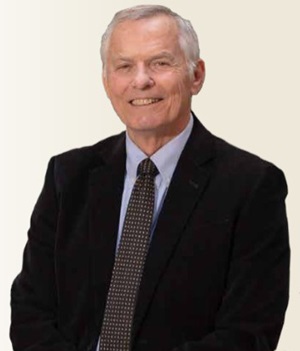 Richard McQuellon, PhD, humbly credits his long and successful career in providing emotional support to patients at Wake Forest Baptist’s Comprehensive Cancer Center to simply saying yes to the right opportunity at the right time.
Richard McQuellon, PhD, humbly credits his long and successful career in providing emotional support to patients at Wake Forest Baptist’s Comprehensive Cancer Center to simply saying yes to the right opportunity at the right time.
“I feel like I have been the beneficiary of having a bus come along that was already outfitted and had people on board,” says McQuellon, who is retiring after directing the Psychosocial Oncology and Cancer Patient Support (CPSP) programs at Atrium Health Wake Forest Baptist for more than 30 years. “When the bus drove up and the door opened, they welcomed me, I got on and we’ve been riding along ever since. I just found a phenomenal bus, and it’s been a great ride.”
It began in 1988, when McQuellon, at the encouragement of colleagues, interviewed with Cancer Center leadership and was given the opportunity to lead the programs after previously working in family medicine and psychiatry at Wake Forest Baptist.
His warm smile, soothing demeanor and deep empathy for cancer patients have become synonymous with the programs, especially the CPSP, which provides counseling, patient education, support groups and other holistic services to cancer patients and their families or caregivers, in many cases free of charge.
“Dr. McQuellon has provided wonderful leadership for our programs that support our cancer patients, and he’s done this for decades,” says Lisa M. Marshall, chief philanthropy officer and vice president of philanthropy and alumni relations for Atrium Health Wake Forest Baptist and the Wake Forest School of Medicine.
“His approach embodies the compassion and emotional support that our programs give to cancer patients. Our Cancer Patient Support Program is a national model for others to follow, and that would not have happened without his leadership.” Marshall said.
William Blackstock, MD, interim director of the Comprehensive Cancer Center, says McQuellon’s “immense contribution” spans support for cancer patients and their families to teaching resilience training to hematology and oncology fellows.
“Dr. McQuellon has had a profound and long-lasting impact on numerous patients and their families treated at our Comprehensive Cancer Center,” Pasche says. “The CPSP was one of the first programs to address the emotional needs of patients with cancer and their families. His leadership combined with the generous philanthropic contributions from the Piedmont Triad community have enabled the CPSP to become a unique differentiating feature of our Comprehensive Cancer Center.”
“I was impressed by these people who were volunteering their time to help,” he says. “This program has its roots in community volunteers, who not only come to the bedside but also to Winterlark to help with fundraising. If you don’t have strong fundraising, you don’t have a program.”
Winterlark is the fundraiser that benefits the CPSP and has provided 50% of the budget for that program annually for almost 40 years. McQuellon has been selected as the honoree of the 2022 Winterlark event.
“As an honoree, I consider myself a representative of hundreds of people over the years who’ve done this work, and I’m privileged to be that representative,” he says.
McQuellon will continue to work part time, teaching in a fellowship program at the Wake Forest School of Medicine, a course at Wake Forest University and leading seminars in therapeutic communication. He also recently published two books, “The Art of Conversation in Cancer Care: Lessons for Caregivers,” co-written with Michael Cowan, and “The Nell Dialogues: Conversation in Mortal Time.”
He leaves the Psychosocial Oncology and Cancer Patient Support programs in the capable hands of Katie Duckworth, PhD, assistant professor of hematology and oncology and a specialist in behavioral health and psychology, who is leading both as director. McQuellon says the programs’ patient-centered mission will continue.
“It’s not about me, it’s about the community of people who make a difference,” he says. “Individuals come and go, but the sense of purpose and community remains. That’s the power of our work with patients, and that will remain long after I’m gone because it’s embedded in the fabric of the institution.”
As he steps aside from his leadership roles and his work with patients, he emphasizes he will miss the “community of healers” who ensure that a cancer diagnosis doesn’t dominate a patient’s life.
He also hopes one thing will remain after he steps aside. “I hope what’s left,” he says, “is a smile.”
